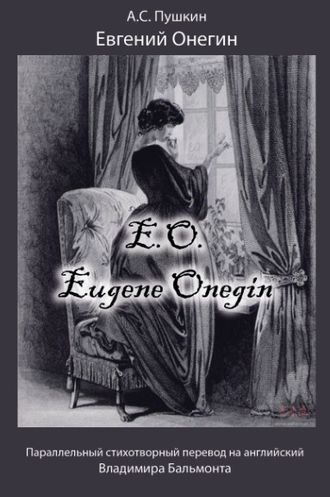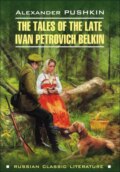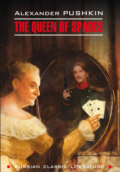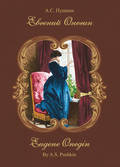
Александр Пушкин
Евгений Онегин / Eugene Onegin
LIII
Нашел он полон двор услуги;
К покойнику со всех сторон
Съезжались недруги и други,
Охотники до похорон.
Покойника похоронили.
Попы и гости ели, пили,
И после важно разошлись,
Как будто делом занялись.
Вот наш Онегин сельский житель,
Заводов, вод, лесов, земель
Хозяин полный, а досель
Порядка враг и расточитель,
И очень рад, что прежний путь
Переменил на что-нибудь.
LIV
Два дня ему казались новы
Уединенные поля,
Прохлада сумрачной дубровы,
Журчанье тихого ручья;
На третий роща, холм и поле
Его не занимали боле;
Потом уж наводили сон;
Потом увидел ясно он,
Что и в деревне скука та же,
Хоть нет ни улиц, ни дворцов,
Ни карт, ни балов, ни стихов.
Хандра ждала его на страже,
И бегала за ним она,
Как тень иль верная жена.
LIII
The stead was full of the complaisance;
Who liked the deceased and disliked
To demonstrate their great compassions
Came visit the burial site.
The uncle’s funeral was set,
The priests and neighbors drank and ate,
And after left with solemn words,
Like being busy afterwards.
Eugene is now the only owner
Of many peasants, forests, lands,
Of rivers, factories and plants,
He, who was order’s foe and squander,
But he is glad that former stay
He’s changed to something, anyway.
LIV
Two days he did it pretty well
Perceiving loneliness of spaces,
The dusk of oak grove in the vale,
A serene brook’s murmuring splashes;
But on the third day of the stay
He found everything the same,
And all this bliss made him asleep,
And he had found quite distinct:
The country is same bore, although,
Without palaces and streets,
Without cards, balls, verses’ rhythms.
Khandra affects him overall,
And it will chase him all his life,
Like shadow or a faithful wife.
LV
Я был рожден для жизни мирной,
Для деревенской тишины:
В глуши звучнее голос лирный,
Живее творческие сны.
Досугам посвятясь невинным,
Брожу над озером пустынным,
И far niente мой закон.
Я каждым утром пробужден
Для сладкой неги и свободы:
Читаю мало, долго сплю,
Летучей славы не ловлю.
Не так ли я в былые годы
Провел в бездействии, в тени
Мои счастливейшие дни?
LVI
Цветы, любовь, деревня, праздность,
Поля! я предан вам душой.
Всегда я рад заметить разность
Между Онегиным и мной,
Чтобы насмешливый читатель
Или какой-нибудь издатель
Замысловатой клеветы,
Сличая здесь мои черты,
Не повторял потом безбожно,
Что намарал я свой портрет,
Как Байрон, гордости поэт,
Как будто нам уж невозможно
Писать поэмы о другом,
Как только о себе самом.
LV
I was conceived for peaceful being,
For country fascinating calm,
The more in thickets, better hearing
Of lyre’s creative tongue and charm.
I stroll by a deserted lake
By naïve pastime entertained,
And far niente[13] is my law.
Each morning I am waking for
The honey bliss and freedom moments:
I read not much and sleep for long
And like I did in days of old
Don’t hunt for glory’s fake adornments.
My best and happiest young days
I spent in idleness in shades.
LVI
The country, flowers, field spaces,
Love, idleness – I adore those!
I’m glad to note the variations,
Which differ my and Eugene’s souls.
I do not want a mocking reader
Or other literature figure
Composing intricate blackwash
Collate Onegin with me, gosh,
Forgetting shame claim it wherever
That a self-portrait I did write,
Like Byron, poet of the pride,
And am not able, never ever,
To write the poems more or less,
But of myself and nothing else.
LVII
Замечу кстати: все поэты –
Любви мечтательной друзья.
Бывало, милые предметы
Мне снились, и душа моя
Их образ тайный сохранила;
Их после Муза оживила:
Так я, беспечен, воспевал
И деву гор, мой идеал,
И пленниц берегов Салгира.
Теперь от вас, мои друзья,
Вопрос нередко слышу я:
«O ком твоя вздыхает лира?
Кому, в толпе ревнивых дев,
Ты посвятил ее напев?
LVIII
Чей взор, волнуя вдохновенье,
Умильной лаской наградил
Твое задумчивое пенье?
Кого твой стих боготворил?»
И, други, никого, ей-богу!
Любви безумную тревогу
Я безотрадно испытал.
Блажен, кто с нею сочетал
Горячку рифм: он тем удвоил
Поэзии священный бред,
Петрарке шествуя вослед,
А муки сердца успокоил,
Поймал и славу между тем;
Но я, любя, был глуп и нем.
LVII
And by the way, the poet’s mind
Reveres the dreamy love, that’s why
The lovely things, I used to find,
Appeared to me in dreams, and I
These covert images retained,
And let my Muse to animate:
Thus, highland virgin I did praise,
Who drew me to a great amaze,
And captives of the Salgir[14] river…
And nowadays from you, my dear,
A frequent question I do hear:
“Who now arouses your lyre’s fever?
To whom of all these jealous lasses
You dedicated your lyre’s graces?
LVIII
Whose gaze, exiting inspiration,
By sweet caress had made a prize
For your poetic meditation?
Whom did your verses idolize? ”
No, friends, by Heaven, no one, yet!
And all my reckless love attempts
Were all in vain with no delight.
These poets blissful, who combined
Both, love and rhythms and by that doubled
The sacred poetry delire
Recalling the great Petrarch’s lyre,
And by the heartache not more troubled
Caught fame and glory by God’s will.
But I in love was dumb and still.
LIX
Прошла любовь, явилась Муза,
И прояснился темный ум.
Свободен, вновь ищу союза
Волшебных звуков, чувств и дум;
Пишу, и сердце не тоскует,
Перо, забывшись, не рисует,
Близ неоконченных стихов,
Ни женских ножек, ни голов;
Погасший пепел уж не вспыхнет,
Я всё грущу; но слез уж нет,
И скоро, скоро бури след
В душе моей совсем утихнет:
Тогда-то я начну писать
Поэму песен в двадцать пять.
LX
Я думал уж о форме плана,
И как героя назову;
Покамест моего романа
Я кончил первую главу;
Пересмотрел все это строго:
Противоречий очень много,
Но их исправить не хочу.
Цензуре долг свой заплачу,
И журналистам на съеденье
Плоды трудов моих отдам:
Иди же к невским берегам,
Новорожденное творенье,
И заслужи мне славы дань:
Кривые толки, шум и брань!
LIX
My Muse had come, when love expired,
She broke the obscured mind’s bonds.
I’m free again, want to combine
My thoughts, and feels, and magic tones.
I write and please by that my heart,
My pen is firm and behaves smart,
At the unfinished rhymes does not
Draw female legs, heads and so forth;
Extinguished ash will not make fire,
I’m still nostalgic, but no tears,
And very soon the stormy feels
Will disappear, leave me in quiet.
I’ll start a poem, then, I guess
Of twenty songs at least, not less.
LX
I built the plot of my new novel
And thought, what would be its content;
And now a page you’re turning over,
Where is first chapter’s very end.
I have examined written strictly:
There are mistakes, if to check neatly;
I won’t amend these or correct.
To censor I will pay my debt,
And, then, present it for reviewing
To journalists – the public wolves.
I beg, my newborn creature, move
To Neva’s banks for public viewing!
Please, earn the tributes of the glory:
The idle talks, clamor and quarrel!
Глава II
I
Деревня, где скучал Евгений,
Была прелестный уголок;
Там друг невинных наслаждений
Благословить бы небо мог.
Господский дом уединенный,
Горой от ветров огражденный,
Стоял над речкою. Вдали
Пред ним пестрели и цвели
Луга и нивы золотые,
Мелькали сёлы; здесь и там
Стада бродили по лугам,
И сени расширял густые
Огромный, запущённый сад,
Приют задумчивых Дриад.
II
Почтенный замок был построен,
Как замки строиться должны:
Отменно прочен и спокоен
Во вкусе умной старины.
Везде высокие покои,
В гостиной штофные обои,
Царей портреты на стенах,
И печи в пестрых изразцах.
Всё это ныне обветшало,
Не знаю право почему;
Да, впрочем, другу моему
В том нужды было очень мало,
Затем что он равно зевал
Средь модных и старинных зал.
Chapter II
I
The country, where Eugene was boring,
Was a scenic and charming place;
The one, who’s innocence enjoying,
This nook would evidently bless.
A landlord house stood in lone
Above a river on a knoll,
Under the lee of a small hill,
In front of it a lovely scene:
The golden fields and blooming meadows,
The villages dropped here and there,
The flocking herds and country air;
An uncared park by a thick shadow
Extended far away its spreads –
A home of meek and mute Dryads.
II
A worthy mansion was erected
As for the castles it should be:
Perfectly durable and tranquil,
In style as smart antiquity.
The lofty chambers all around,
Damask wallpaper in the parlor,
The royal portraits on the walls,
The parti-colored tiles on stoves.
All that has now dilapidated,
And I don’t really know why,
So far as for the friend of mine,
He wasn’t at all by that affected,
Since he was yawning when he strolled
Both, modern room and ancient hall.
III
Он в том покое поселился,
Где деревенский старожил
Лет сорок с ключницей бранился,
В окно смотрел и мух давил.
Все было просто: пол дубовый,
Два шкафа, стол, диван пуховый,
Нигде ни пятнышка чернил.
Онегин шкафы отворил:
В одном нашел тетрадь расхода,
В другом наливок целый строй,
Кувшины с яблочной водой
И календарь осьмого года;
Старик, имея много дел,
В иные книги не глядел.
IV
Один среди своих владений,
Чтоб только время проводить,
Сперва задумал наш Евгений
Порядок новый учредить.
В своей глуши мудрец пустынный,
Ярем он барщины старинной
Оброком легким заменил;
И раб судьбу благословил.
Зато в углу своем надулся,
Увидя в этом страшный вред,
Его расчетливый сосед.
Другой лукаво улыбнулся,
И в голос все решили так,
Что он опаснейший чудак.
III
He’d settled in the mansion’s chamber,
Where the old timer for great whiles
With housekeeper used to ramble,
Sat at a window and crushed flies.
Everything casual: the oak floors,
The table, sofa, two cupboards,
And not a speck of ink, do note.
Onegin opened one cupboard –
Obtained the housekeeper’s papers,
The other one – the bottles line,
A row of jugs with apple wine,
Eighteen eighth calendar, the latest.
The old was busy at all times
And other books didn’t recognize.
IV
Onegin bored, and then decided,
Just idle time to pass away,
To change routine and thus provided
A reformation in estate.
And in his nook the sage of desert
The corvee – ancient yoke of peasant
By easy quitrent had replaced,
And serf had blessed the divine grace.
But thrifty neighbor was in pouts,
Suspecting in it a great harm
To his hereditary farm,
Another archly smiled in doubts,
And all of them made a conclusion
That he is awfully unusual.
V
Сначала все к нему езжали;
Но так как с заднего крыльца
Обыкновенно подавали
Ему донского жеребца,
Лишь только вдоль большой дороги
Заслышит их домашни дроги, –
Поступком оскорбясь таким,
Все дружбу прекратили с ним.
«Сосед наш неуч, сумасбродит,
Он фармазон; он пьет одно
Стаканом красное вино;
Он дамам к ручке не подходит;
Все да да нет; не скажет да-с
Иль нет-с». Таков был общий глас.
VI
В свою деревню в ту же пору
Помещик новый прискакал
И столь же строгому разбору
В соседстве повод подавал.
По имени Владимир Ленской,
С душою прямо геттингенской,
Красавец, в полном цвете лет,
Поклонник Канта и поэт.
Он из Германии туманной
Привез учености плоды:
Вольнолюбивые мечты,
Дух пылкий и довольно странный,
Всегда восторженную речь
И кудри черные до плеч.
V
At first all neighbors gave him visits,
But since he used at the back porch
To keep a steed and quickly use it
Just hearing an approaching coach,
It did not make the neighbors glad,
Some of them really got mad,
And they all stopped attempts to deal
And even keep in touch with him.
“He’s ignoramus, behaves wildly;
He is freemason, that is why
Drinks from a tumbler just red wine;
Doesn’t kiss dames’ hands, doesn’t bow politely,
Dose not say yes, ma’am, or no, sir,
But always simply yes or no”.
VI
It’d happened that another landlord
At the same time nearby arrived
And to the same conformist neighbor
A cause for gossip did provide.
Vladimir Lensky was his name,
With soul like born in Göttingen,
A handsome in the prime of life,
A poet, and with Kant in love.
In misty Germany he’d borrowed
The elevated expertise:
The freedom-loving reveries,
An ardent spirit (quite uncommon),
Rhapsodic manor of the talk,
And the black curls to shoulders long.
VII
От хладного разврата света
Еще увянуть не успев,
Его душа была согрета
Приветом друга, лаской дев.
Он сердцем милый был невежда,
Его лелеяла надежда,
И мира новый блеск и шум
Еще пленяли юный ум.
Он забавлял мечтою сладкой
Сомненья сердца своего;
Цель жизни нашей для него
Была заманчивой загадкой,
Над ней он голову ломал
И чудеса подозревал.
VIII
Он верил, что душа родная
Соединиться с ним должна,
Что, безотрадно изнывая,
Его вседневно ждет она;
Он верил, что друзья готовы
За честь его приять оковы,
И что не дрогнет их рука
Разбить сосуд клеветника;
Что есть избранные судьбами,
Людей священные друзья;
Что их бессмертная семья
Неотразимыми лучами,
Когда-нибудь, нас озарит
И мир блаженством одарит.
VII
He was too young to be depraved
By high society’s dissipation,
His soul was warmed up by the care
Of friends and maidens’ adoration.
At heart an ignorant naïve,
He cherished hope and was deceived
By the new world’s uproar and shine
That still imprisoned his young mind.
He entertained his soul by dreaming
To pacify the mind’s doubt,
And could not stop to think about
The purpose of the human being.
That was the thing that racked his brains,
And he perceived the magic tales.
VIII
And he believed, there is a soul,
Which’s of a similar communion,
And languishing it’s searching for
The one with whom would make a union.
And he believed that he had friends,
Who’d accept for his honor chains,
And non of them would ever waver
To smash a vessel of a slander;
That there are chosen by the fortune
The people’s sacramental friends,
Sometimes they’ll get the magic brands
And save humanity from tortures;
The world will stay in pleasant tranquil,
And people will be for that thankful.
IX
Негодованье, сожаленье,
Ко благу чистая любовь
И славы сладкое мученье
В нем рано волновали кровь.
Он с лирой странствовал на свете;
Под небом Шиллера и Гете
Их поэтическим огнем
Душа воспламенилаcь в нем.
И Муз возвышенных искусства,
Счастливец, он не постыдил;
Он в песнях гордо сохранил
Всегда возвышенные чувства,
Порывы девственной мечты
И прелесть важной простоты.
X
Он пел любовь, любви послушный,
И песнь его была ясна,
Как мысли девы простодушной,
Как сон младенца, как луна
В пустынях неба безмятежных,
Богиня тайн и вздохов нежных.
Он пел разлуку и печаль,
И нечто, и туманну даль,
И романтические розы;
Он пел те дальные страны,
Где долго в лоно тишины
Лились его живые слезы;
Он пел поблеклый жизни цвет
Без малого в осьмнадцать лет.
IX
Regret, deep sorrow, indignation
And for the glory honey craving
Alike stirred his blood agitation,
Since young enkindled his soul flaming.
He wandered in the world with lyre
Under the Schiller-Goethe’s sky;
And their creative Muses’ blaze
Had brought his soul into amaze.
The elevated Muses’ lyrics
He, being lucky man, maintained,
And in his songs with pride retained
The always lofty noble feelings,
The impulses of virgin dream
And charming ease in high esteem.
X
He song the love to love devoted,
His lyric tongue was pure and bright,
Like dreams a virgin openhearted,
Like sleeps a newborn, like at night
The Luna in the sky is shining,
Goddess of mystery and sighing.
He song sad parting and deplored
An obscured something in remote.
Romantic roses glorifying
He song the countries far away,
Where being in a dream one day
He shed the alive tears in quiet;
He song the withered being cold
And was not, yet, eighteen years old.
XI
В пустыне, где один Евгений
Мог оценить его дары,
Господ соседственных селений
Ему не нравились пиры;
Бежал он их беседы шумной.
Их разговор благоразумный
О сенокосе, о вине,
О псарне, о своей родне,
Конечно, не блистал ни чувством,
Ни поэтическим огнем,
Ни остротою, ни умом,
Ни общежития искусством;
Но разговор их милых жен
Гораздо меньше был умен.
XII
Богат, хорош собою, Ленской
Везде был принят как жених;
Таков обычай деревенской;
Все дочек прочили своих
За полурусского соседа;
Взойдет ли он, тотчас беседа
Заводит слово стороной
О скуке жизни холостой;
Зовут соседа к самовару,
А Дуня разливает чай,
Ей шепчут: «Дуня, примечай!»
Потом приносят и гитару:
И запищит она (бог мой!).
Приди в чертог ко мне златой!..
XI
In wilderness, where Eugene only
Could value his romantic gifts,
He didn’t like visit local landlords,
Who entertained themselves by feasts.
And he kept off their noisy sessions
And the judicious conversations
About haying, taste of wine,
About dogs and kin of mine.
They didn’t excel neither by feeling,
Nor by poetic charming flame,
Neither by wittiness of brain,
Nor by the art of common living.
But conversations of their wives
Were even worse and much less wise.
XII
Vladimir being rich and handsome
Was cared as bridegroom candidate,
It is a countrymen’s convention:
Search for a daughter a good mate.
He just comes in and is attacked
By the suggestions hinted at
The boredom of unmarried life
And pleasantness of a nice wife.
They call him to a samovar,
Where Dunya pours a cup of tee,
They whisper: “Dunya, do you see!»
And after bring her a guitar:
And she begins to squeak (my God!)
Come to my chamber made of gold!
XIII
Но Ленский, не имев конечно
Охоты узы брака несть,
С Онегиным желал сердечно
Знакомство покороче свесть.
Они сошлись. Волна и камень,
Стихи и проза, лед и пламень
Не столь различны меж собой.
Сперва взаимной разнотой
Они друг другу были скучны;
Потом понравились; потом
Съезжались каждый день верхом,
И скоро стали неразлучны.
Так люди (первый каюсь я)
От делать нечего друзья.
XIV
Но дружбы нет и той меж нами.
Все предрассудки истребя,
Мы почитаем всех нулями,
А единицами – себя.
Мы все глядим в Наполеоны;
Двуногих тварей миллионы
Для нас орудие одно;
Нам чувство дико и смешно.
Сноснее многих был Евгений;
Хоть он людей конечно знал
И вообще их презирал, –
Но (правил нет без исключений)
Иных он очень отличал
И вчуже чувство уважал.
XIII
But Lensky not at all desired
To bear the heavy wedlock chains,
And was sincerely inspired
With my Onegin to make friends.
What distance is from ice to flame,
From prose to verse, from rock to wave?
Nothing could differ more than those!
They got in contact and at first
Both bored when gathering together,
Then liked each other; shortly they
Met riding horseback every day,
Stroke up close friendship just forever.
Thus, people (yes, I do repent)
Of doing nothing get a friend.
XIV
But what is friendship? We consider
(The prejudice we extirpate)
The friends to be the added zero,
We are the figures of high rate.
We’ll be Napoleons, no kidding;
And all these two-legged human beings,
Are just an implement, and thus,
A feel is absurd thing to us.
Onegin had more just perception;
Yes, he had learned the people well,
In general despised all them,
But (are there rules with no exception?)
To some of these he showed respect,
And feels of those did not neglect.
XV
Он слушал Ленского с улыбкой.
Поэта пылкий разговор,
И ум, еще в сужденьях зыбкой,
И вечно вдохновенный взор, –
Онегину всё было ново;
Он охладительное слово
В устах старался удержать
И думал: глупо мне мешать
Его минутному блаженству;
И без меня пора придет;
Пускай покамест он живет
Да верит мира совершенству;
Простим горячке юных лет
И юный жар и юный бред.
XVI
Меж ими всё рождало споры
И к размышлению влекло:
Племен минувших договоры,
Плоды наук, добро и зло,
И предрассудки вековые,
И гроба тайны роковые,
Судьба и жизнь в свою чреду,
Все подвергалось их суду.
Поэт в жару своих суждений
Читал, забывшись, между тем
Отрывки северных поэм,
И снисходительный Евгений,
Хоть их не много понимал,
Прилежно юноше внимал.
XV
Thus, Lensky’s speech evoked his smile.
The poet’s flaming conversation,
Inspired gaze and mind’s style,
Yet, not too firm in estimations,
All that looked to Eugene quite new;
And to make calming down review
He did not hurry, since he thought
That it is not too smart to stop
This minute-long gushing existence.
Let him, so far, in that believe
And with that faith in life still live;
It’ll stop without my assistance.
Forgive to fever of young years
Delirium and passions’ flares.
XVI
All matters caused argumentations,
Invited them to clarify:
What were the tribes negotiations,
The fruits of learning, truth and lie?
The superstitions centuries old,
The coffin mysteries dead cold,
The fate and life were analyzed,
Severely judged and criticized.
The poet in a flame of judgment
Read in oblivion time to time
The extracts from a northern rhyme,
Onegin, patient and indulgent,
Though could not catch it in detail,
Still listened to him fairly well.






